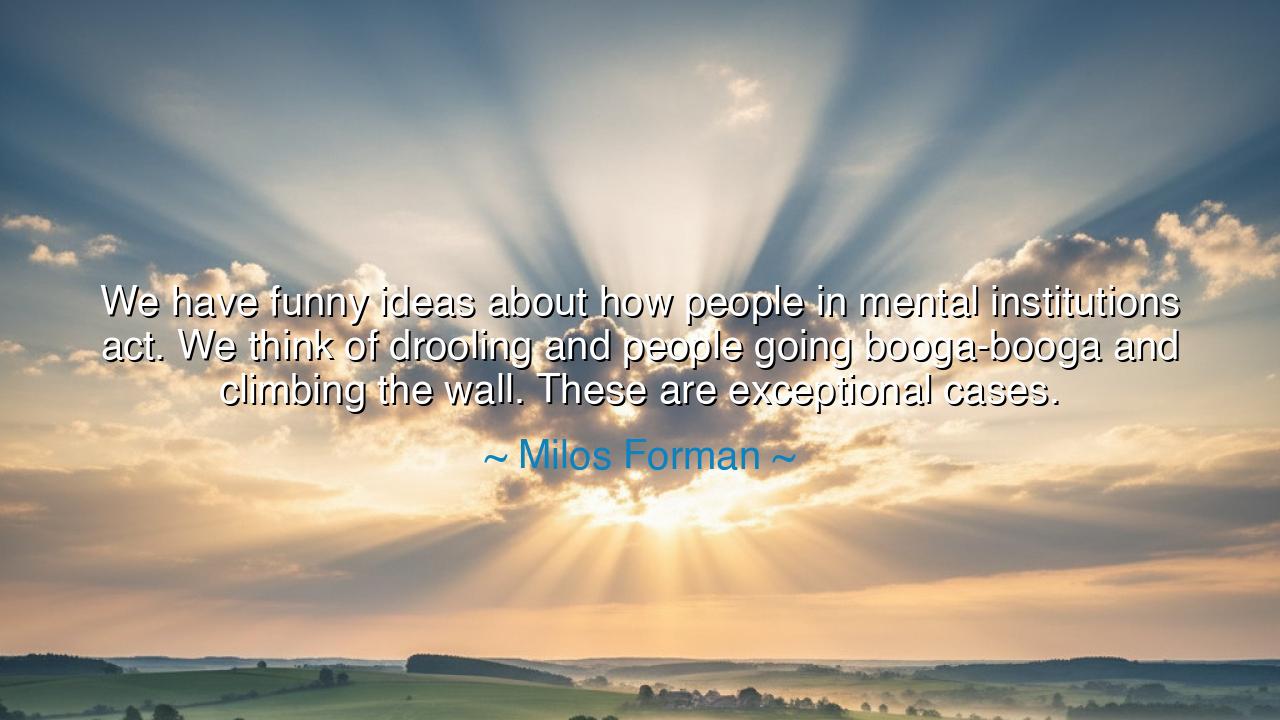
We have funny ideas about how people in mental institutions act.
We have funny ideas about how people in mental institutions act. We think of drooling and people going booga-booga and climbing the wall. These are exceptional cases.






“We have funny ideas about how people in mental institutions act. We think of drooling and people going booga-booga and climbing the wall. These are exceptional cases.” — thus spoke Milos Forman, the visionary filmmaker who illuminated the hidden truths of humanity through his art. In this quote, he speaks not merely of misunderstanding, but of compassion, ignorance, and the tragic divide between perception and reality. Beneath his calm tone lies a fierce wisdom: that the human mind, even when troubled, deserves to be seen not through caricature or fear, but through understanding and dignity.
The origin of these words can be traced to Forman’s deep personal and artistic connection to the world of those considered “outsiders.” As the director of One Flew Over the Cuckoo’s Nest — one of the most powerful films ever made about life inside a mental institution — Forman sought to portray not madness, but humanity imprisoned by misunderstanding. His words remind us that the exaggerated images we hold — of chaos, incoherence, and helplessness — are illusions born of fear and ignorance. The “booga-booga” that he mocks is not the reality of mental illness, but the distortion that society creates to keep itself comfortable. In truth, those who dwell in institutions are not monsters or curiosities; they are mirrors of our own fragility, our own unspoken struggles, our own human condition.
Forman’s perspective was shaped by his own experience growing up under oppression. Born in Czechoslovakia and orphaned by war, he understood how systems can strip people of individuality and reduce them to labels — “mad,” “criminal,” “enemy.” His films often spoke against this erasure, reminding us that every soul, no matter how broken or strange, possesses dignity. In Cuckoo’s Nest, the patients are not insane caricatures; they are wounded beings yearning for connection, imprisoned more by society’s cruelty than by their own minds. The “exceptional cases” Forman speaks of — the truly unrestrained or violent — exist, yes, but they are not the measure of all. To judge the many by the few is to blind oneself to truth.
This insight echoes through the ages. The philosopher Socrates was once declared mad for challenging Athens’ conventions; the artist Van Gogh, now revered as a genius, was confined to an asylum and dismissed as unstable. Time has proven that what society calls madness is often misunderstood sensitivity, a mind too alive, too aware, or too wounded to bear the weight of the world. Forman’s quote reminds us that those confined behind the walls of institutions are not lesser beings, but human souls navigating realities we may never comprehend. Their pain may not look like ours, but it springs from the same source — the heart’s desire for peace, love, and meaning.
There is also humility in Forman’s words. He acknowledges that our collective imagination often distorts what we fear. When he says, “We have funny ideas,” he exposes the arrogance of judgment — how easily people laugh or recoil from what they do not understand. The term “funny,” here, is not light; it carries the weight of irony. It is funny in the way tragedy can appear absurd — the way society chooses illusion over truth because illusion is easier. It is easier to imagine “drooling and climbing the walls” than to confront the quiet, painful truth that mental illness dwells near to all of us, that the mind’s balance is fragile, that madness and sanity are not opposites, but neighbors.
Consider the story of Nellie Bly, the pioneering journalist who, in 1887, faked insanity to investigate the conditions of the Blackwell’s Island Asylum in New York. She discovered not a den of raving lunatics, but a house of suffering — where sane women were imprisoned for convenience, and the sick were treated with cruelty instead of care. Her exposé changed the world, inspiring reforms and revealing the profound humanity of those society had hidden away. In this, she lived out what Forman would later capture on screen: that the so-called “mad” are not monsters but victims of misunderstanding — and that true madness often lies in the indifference of those who call themselves sane.
The lesson of Forman’s words is eternal: do not let fear or ignorance shape your understanding of others. When you see someone broken, lost, or different, do not reduce them to the exaggerated images you have been taught. Seek the truth beneath the label. Remember that every human being carries storms within — and that compassion, not judgment, is the path to wisdom. The sane and the insane are bound by the same fragile thread; the only difference is where fate chooses to pull it.
Thus spoke Milos Forman, a teller of stories who revealed the quiet heroism of the forgotten. His words stand as a warning and a call — to see beyond the walls of fear and to honor the humanity that lives within every soul. For if we continue to view the wounded as spectacles, we only deepen their wounds. But if we see them as brothers and sisters in suffering, we heal both them and ourselves. The next time you think of “madness,” remember: it is not in their eyes that insanity lives, but often in our refusal to look at them with love.






AAdministratorAdministrator
Welcome, honored guests. Please leave a comment, we will respond soon